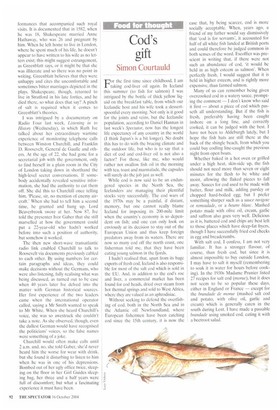Cod's gift
Simon Courtauld
ilor the first time since childhood, I am
taking cod-liver oil again. In Iceland this summer (to fish for salmon) I was intrigued by the bottle of thick yellow liquid on the breakfast table, from which our Icelandic host and his wife took a dessertspoonful every morning. Not only is it good for the joints and veins, but the Icelandic population, according to Daniel Hannan in last week's Spectator, now has the longest life expectancy of any country in the world (I think Japan's is a bit longer). No doubt this has to do with the bracing climate and the outdoor life, but who is to say that a diet of cod and cod-liver oil is not also a factor? For those, like me, who would rather not swallow fish oil in the morning with tea, toast and marmalade, the capsules will surely do the job just as well.
While cod is now said to be an endangered species in the North Sea, the Icelanders are managing their plentiful stocks very successfully. The cod wars of the 1970s may be a painful, if distant, memory, but one cannot really blame Iceland for imposing its 200-mile limit when the country's economy is so dependent on fish; and one can only look on enviously at its decision to stay out of the European Union and thus keep foreign predators away from its waters. There are now so many cod off the north coast, one fisherman told me, that they have been eating young salmon in the fjords.
I hadn't realised that, apart from its huge exports of fresh cod, Iceland is also responsible for most of the salt cod which is sold in the EU. And, in addition to the cod's roe and liver, a commercial market has been found for cod heads, dried over steam from hot thermal springs and sold to West Africa, where they are valued as an aphrodisiac.
Without seeking to defend the overfishing of cod, both in the North Sea and in the Atlantic off Newfoundland, where European fishermen have been catching cod since the 15th century, it is now the
case that, by being scarcer, cod is more socially acceptable. When, years ago, a friend of my father would say dismissively that 'cod is for servants', it accounted for half of all white fish landed at British ports and could therefore be judged common in both senses of the word. Escoffier was prescient in writing that, if there were not such an abundance of cod, 'it would be held in as high esteem as salmon'. When perfectly fresh, I would suggest that it is held in higher esteem, and is rightly more expensive, than farmed salmon.
Many of us can remember being given overcooked cod in a watery sauce, prompting the comment — I don't know who said it first — about a piece of cod which passeth all understanding. But if the fish is fresh, preferably having been caught inshore on a long line, and correctly cooked, it can be judged with the best. I have not been to Aldeburgh lately, but I hope the fish huts are still there at the back of the shingle beach, from which you could buy codling line-caught the previous night from open boats.
Whether baked in a hot oven or grilled under a high heat, skin-side up, the fish should not need more than seven or eight minutes for the flesh to be white and moist, allowing the flaked pieces to fall away. Sauces for cod used to be made with butter, flour and milk, adding parsley or chopped hard-boiled egg; but I prefer something sharper such as a sauce ravigote or remoulade, or a beurre blanc. Mashed potato made with olive oil, cream, garlic and saffron also goes very well. Delicious as it is, battered cod and chips are best left to those places which have deep-fat fryers, though I have successfully fried cod cheeks in egg and breadcrumbs.
With salt cod, I confess, I am not very familiar. It has a stronger flavour, of course, than fresh cod, but since it is almost impossible to buy outside London, I may have to salt it myself (remembering to soak it in water for hours before cooking). In the 1930s Madame Prunier listed 27 recipes for salt cod (morue), but it does not seem to be so popular these days, either in England or France — except for the brandade de morue (mashed salt cod and potato, with olive oil, garlic and cream) which is generally eaten in the south during Lent. I have made a passable brandade using smoked cod, eating it with a beetroot salad.










































































































 Previous page
Previous page